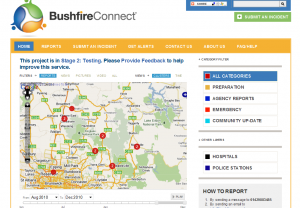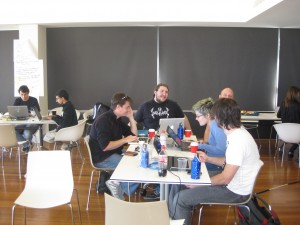With just over a week to go, Random Hacks of Kindness (RHoK) Toronto is gearing up. We have some updates for participants, potential sponsors and supporters.

What is RHoK?
Random Hacks of Kindness (RHoK) is a joint initiative between Microsoft, Google, Yahoo!, NASA, and the World Bank, with the objective of creating solutions that have an impact in disaster management and crisis response. Together they hold semi-annual simultaneous global hackathons (marathon coding events) over one weekend. The event brings together subject matter experts from all over the world in software development, open data, project management, graphic design, videography, emergency management, technology, research, knowledge translation, logistics, just to name a few. Also, see the RHoK global press release.
Before RHoK
RHoK Toronto has 50 participants registered. Won’t you Join us?
Pre-RHoK event for participants:
We invite you to attend our RHoK Warm-up
Date: Wednesday, June 1, 2011
Time: 19:00 – 21:00 ET
Location: Camaraderie
Address: 102 Adelaide St E.
Meet your fellow hackers, ask questions about the event and brainstorm on the problem definitions.
Recruiting Sponsors:
Our amazing sponsors are providing food and prizes. We are happy to announce CIRA, Jonah Group, Syncapse, University of Toronto and Camaraderie are joining us as sponsors for the second year. Thanks! And, to Marketcrashers/Hackernest for joining us with a prize donation.
If you are a potential sponsor willing to contribute prizes or donate funds for food, please drop us a line at rhokto at Gmail dot com or contact heather at textontechs dot com for more details. We commit to account and use all funds for the event. As per RHoK Global guidelines, we will donate any unused funds to the Canadian Red Cross.
In return for your kindness, we can add your organizational name and logo to the RHoK website, include your name in our media outreach, add postings to our job board and provide you with post event blog content.
Share a Problem Definition:
The RHoK Global team and our local curation team are working on problem definitions. You can submit ideas on the RHoK site or for either of these two call-to-actions:
Calling all Health2.0 Enthusiasts for RHoK, June 4th & 5th
Calling all Climate Change and Open Data Enthusiasts
RHoK Main Event Schedule: June 4 – 5, 2011
RHoK Toronto Location:
University of Toronto
OISE
252 Bloor Street West, 5th floor
Toronto, Ontario M5S 1V5
Schedule:
Saturday, June 4, 2011
8:00 – 9:00am Arrive and enjoy breakfast
9:00 -9:30 Introductions and Questions
9:30 – 11:30 Pick your problem definitions and teams. Start brainstorming
11:30 – 1:00 Lunch
1:00 – 5:00 Coding, doing, brainstorming
5:00 – 6:00 Stand-up – Quick Discussion about your team’s work
6:00 – 7:00 pm Dinner
7:00 – ongoing (Optional to stay late. Otherwise, we’ll see you the next day)
Midnight – home
Sunday, June 5, 2011
8:00 – 9:00 am Arrive and enjoy breakfast
9-11:30 More coding
11:30 – 12:30 Lunch
12:30 – 3:00 Go teams!
3:00 – 5:30 Demos and Prizes
6:00pm End of event
What to bring:
laptop, electrical power bar, headphones, phone and charger, video camera, camera, webcam, demo equipment, coffee mug, a smile and an open mind.
How to prepare:
Review the problem definitions on the RHoK website. The definitions are still being created, so keep checking back. Please take a moment and familiarize yourself with all the tools available to you online before the main event. Some of the tools we might use to collaborate are: IRC, Skype, Github, Wiki, Google Docs, Ustream, Twitter, Facebook and Piratepad. All hacks created are open source.
RHoK Toronto needs some help:
Volunteer run community events always need many hands to make it successful. Here are some ways you can help:
- There will be errands for food and supplies. Can you help on Friday evening or Saturday for logistics (registration, food delivery, etc.)?
- We seek a sponsor or volunteer who can provide standard equipment for demos (including mobile devices), a video camera and microphones. This includes some onsite support and set-up. We want the hackers to be heard and to shine. You could really make a difference by lending your expertise.
The RHoK Toronto team:
RHoK Toronto is a collective of talented folks working hard to make this happen:
David Black, Melanie Gorka, Brian Chick, Christine Crowley, Amy Coulterman, Jessica Hazen, James Walker, Aaron McGowan and myself.
Also, we are thankful for all our supporters who are sending outreach for participants and sponsors. A special thanks to Greg Wilson for everything he does.
See you soon,
Heather



